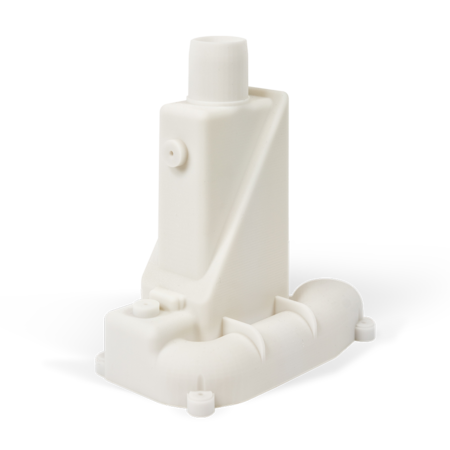When it comes to optics, looks can be deceiving. Hours upon hours of design, development and trial and error are poured into the final products Bushnell offers in the sporting goods aisle, from binoculars and rifle scopes to any of the other high quality visual aids the company produces. As a category leader for over 70 years, Bushnell promises its customers clarity, durability and technology in order to provide the best possible user experience. To deliver on these promises and introduce revolutionary new capabilities in optics, Bushnell’s in-house design team has recruited some technology of its own, including a ProJet® MJP 2500 3D printer by 3D Systems.
True-to-CAD precision
Prior to purchasing its in-house 3D printer, Bushnell relied on traditional design verification methods such as machining in order to evaluate the form and fit of various optics components. While machining delivered on accuracy, it came with drawbacks in both time and cost. Each design iteration not only came with a dollar price, but the delay it caused taxed overall productivity. Eager to operate more efficiently, Bushnell began researching various options available in 3D printing to take ownership over its design and development timelines.
In order to confidently introduce a new technology to the highly detailed world of optics, Bushnell would not make any exceptions where precision was concerned. “We wanted something that would allow us to take our solid CAD model and produce it exactly as outlined by the CAD software,” said Jake VanBecelaere, R&D/Engineering Manager of Optics at Bushnell. “Since we’re working with high quality optics we have a lot of high tolerance parts that we work with, and we wanted to be able to send that to the 3D printer and print off what we needed.”
Working with D3 Technologies out of Springfield, MO, Bushnell’s search led them to select a digital manufacturing workflow powered by 3D Systems solutions. This workflow features the ProJet MJP 2500, VisiJet® M2 Rigid prototyping materials, the MJP EasyClean System and 3D Systems’ file optimization, preparation and printer management software, 3D Sprint™. According to VanBecelaere, this workflow has helped Bushnell achieve high quality, high resolution parts quickly and at relatively low cost.
With a maximum build envelope capacity of 11.6 in x 8.3 in x 5.6 in (295 mm x 211 mm x 142 mm), the ProJet MJP 2500 is ideally sized for the workshop environment for quick turnaround delivery of precision parts. The ProJet MJP 2500 ships with 3D Systems 3D Sprint® software and is compatible with a range of robust and versatile VisiJet M2 materials to deliver superior edge fidelity, surface finish and accuracy. These capabilities have helped Bushnell achieve highly detailed optics prototypes quickly and confidently, to evolve designs with accurate real world feedback. The MJP EasyClean System further facilitates the delivery of damage-free detailed parts by enabling hands-off support removal for fast and simple post-processing.
The mid-modulus tensile properties and high flexural strength of VisiJet M2R-WT (rigid white) material give Bushnell the option to build parts for a variety of applications and designs. Combined with the high resolution of the ProJet MJP 2500, Bushnell is able to reliably and repeatedly achieve highly detailed prints, which VanBecelaere says is critical to Bushnell’s optics team. “Most of the print work we do is directly related to design and is really thin walls with really finite details,” he says. Therefore, when researching potential printers and materials to bring on board, accuracy and resolution were at the top of the list.
According to VanBecelaere, the ProJet MJP 2500’s ability to print details was key to setting 3D Systems’ technology apart, along with the company’s active and ongoing innovation in the field. “The development that 3D Systems does was definitely another thing that was very attractive,” says VanBecelaere.
Quick design feedback
With its purchase decision made, Bushnell was quick to incorporate the ProJet MJP 2500 into its design and development workflow. Productivity improvements were felt immediately, with the 24/7 runtime of the printer allowing Bushnell to deliver jobs overnight for evaluation in the morning. VanBecelaere says typical 3D printing jobs start just before the end of the day, when a handful of prints are loaded onto the machine for lights out operation.
“If we were to machine or injection mold these parts, we would end up waiting several weeks or sometimes months to get design feedback,” says VanBecelaere. Instead, the printer’s quick set up and reliable operation contributes an easy, overnight productivity boost that has shaved significant downtime from Bushnell’s approach to prototyping.
In addition to helping Bushnell get through development faster than previous processes, VanBecelaere says the ProJet MJP 2500 has helped the optics division save a significant amount of money. “If we were to machine all the parts we make with our ProJet, we would have broken even with the printer a long time ago,” he says.
A cost-effective solution
The versatility of Bushnell’s new digital manufacturing workflow has enabled additional departments within the company to benefit from these new in-house prototyping capabilities. 3D Systems’ solutions have become a resource for other divisions within Bushnell from shooting to golf, including ergonomic grip testing as well as other functional design aspects that Bushnell continually strives to perfect.
Across use cases, the print speeds and true-to-CAD reliability of the parts Bushnell can achieve have proven the machine’s value within optics and beyond. “The ProJet MJP 2500 has added a lot of value and gotten us through development faster than ever before,” says VanBecelaere. “If you’re trying to save money and develop parts quickly, it can definitely help you achieve that.”
Are you interested in advancing your product development cycle with fast and accurate 3D printed prototypes or functional parts? Contact 3D Systems today to learn more about the ProJet MJP 2500 Series.

